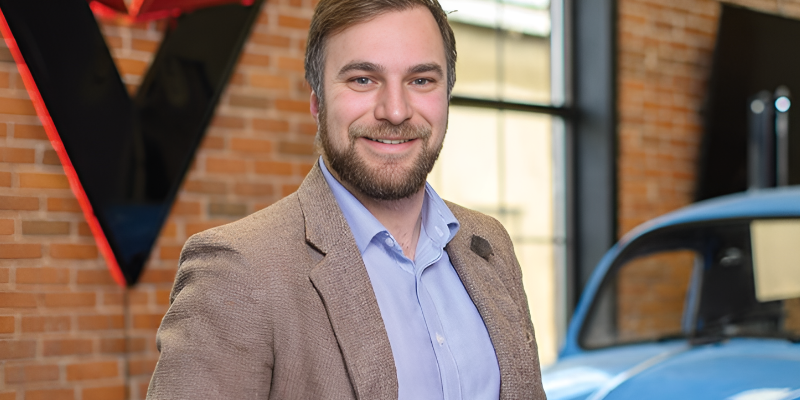Providing a more sustainable alternative in the electric vehicle market
Author: UNB Alumni
Posted on Apr 22, 2024
Category: Inspiring Stories , Engineering , UNB Fredericton , Young Alumni

Isaac Barkhouse (BScEng’19, M-TME’19) is pretty satisfied with his career to date – and he’s only 30.
As co-founder and chief technology officer for Victory Advanced Technologies, he’s developing rugged, high-performance, sustainable electric motors that power the green transportation transition. Prior to that, he co-founded and was CTO at Potential Motors, helping to develop multidisciplinary vehicle architecture that justified a $2.5 million seed round of venture capital while he was there. And last year, he was named one of 2023's 20 Under 30 Innovators in Atlantic Canada by Atlantic Business Magazine.
Isaac knew he wanted to build a career in sustainable technology even when he was in high school. Born in Nova Scotia but living in Alberta as a teen, Isaac began his undergraduate studies at the University of Alberta. He soon found that he wanted something more flexible that would allow him to gain multidisciplinary knowledge while focusing on his particular interest. His father, Tyler Barkhouse (BScEng’87), a UNB engineering grad, along with Yves Losier, a teaching professor and academic advisor with UNB’s engineering faculty, convinced him to go back east to Fredericton.
Isaac studied both mechanic and electrical engineering at UNB and loved having the ability to do both. “The world doesn’t exist in one domain. There is no such thing as an electrical or mechanical problem anymore – you need a multidisciplinary understanding. I was thrilled to have so much support at UNB to study in this way.” He also took advantage of summer internships, working for two summers at Bosch GmbH in Germany in their electromobility services and sensor characterization divisions. “It was a fantastic experience.”
It was in Germany where Isaac and Sam Poirier (BScEng'19, M-TME'19), future co-founder and CEO of Potential Motors, met. “Sam was also in Germany on an internship, and while there we chatted about an idea to build out electric tractors in order to help poor farmers in India and Africa, since diesel is so expensive there. Although this original concept wasn’t viable, we pivoted toward converting gas-powered vehicles to electric.”
In 2018, as part of their senior design project in the Technology Management and Entrepreneurship program in Engineering, Isaac, Sam and colleagues Nick Dowling (BScEng'18, D-TME'18) and Michael Barnhill (BScEng'18) founded Potential Motors. “It hadn’t really crossed my mind that I would start a business. I just wanted to work on electric powertrains and focus on multidisciplinary engineering. But the business was exciting, we all worked together really well, and we were given the opportunity to learn how to access funding and investments and build a business plan through the Summer Institute. We began seeing success, and both Sam and I continued studying for a master’s in TME, Nick enrolled in Energia Ventures and Mike went west. All the while we continued building the business.”
During this time, I had become aware of the perception that seemed to exist that in order to succeed in business, you had to leave New Brunswick. But the programs we were involved in helped us establish an invaluable network right here. We had mentors that included Radian6 co-founders Marcel Lebrun (BScEng'92, DSc'16), Chris Newton and Chris Ramsey (BScCS'94). They not only helped us expand our scope, they instilled in us that we could dream bigger and succeed right here in the province. We received so much support, and it made me even more determined to create the career I always dreamed of while also giving something back to my community and the people here.”
Isaac eventually moved to Saint John and left Potential Motors, where he met Steve Belyea, founder and CEO of BASE Engineering. Steve recruited Isaac to help with an electric vehicle hobby project, and they quickly realized that sourcing components to build electric powertrains was difficult. “The parts were scarce, so we made our own. And we realized that the market for rugged electric powertrain motors – those perfect for Canadian weather and landscapes – was big. The phone started ringing off the hook.”
“But there was also something still weighing on me. While electric vehicles are cleaner than gas, they’re still not living up to the promise for a sustainable planet. We need to do better. So that’s what we’ve been doing. Our design choices are linked with our values and we make the extra effort to find sustainable supply chains for parts. We make a ton of little decisions that add up to our goal of being more sustainable.”
They’re on track. In March of 2024, Victory Advanced Technologies received funding from ACOA’s Regional Economic Growth through Innovation program. “This incredible funding will help us to grow here in Saint John and offer a sustainable, ethical alternative to other electric motors on the market, in the automotive, aerospace and marine industries.”
Isaac is already proud of the career he’s carved out, and is excited to be “doing something that matters on the world stage, from right here in New Brunswick.” “I did everything I could to meet my goals. I was blessed to know what I wanted early on, and my dad instilled in me a love for the environment. I want to be part of the solution, tackle challenging problems, and do what I can to improve our planet and contribute to our community. It’s an honour to be able to do this.”